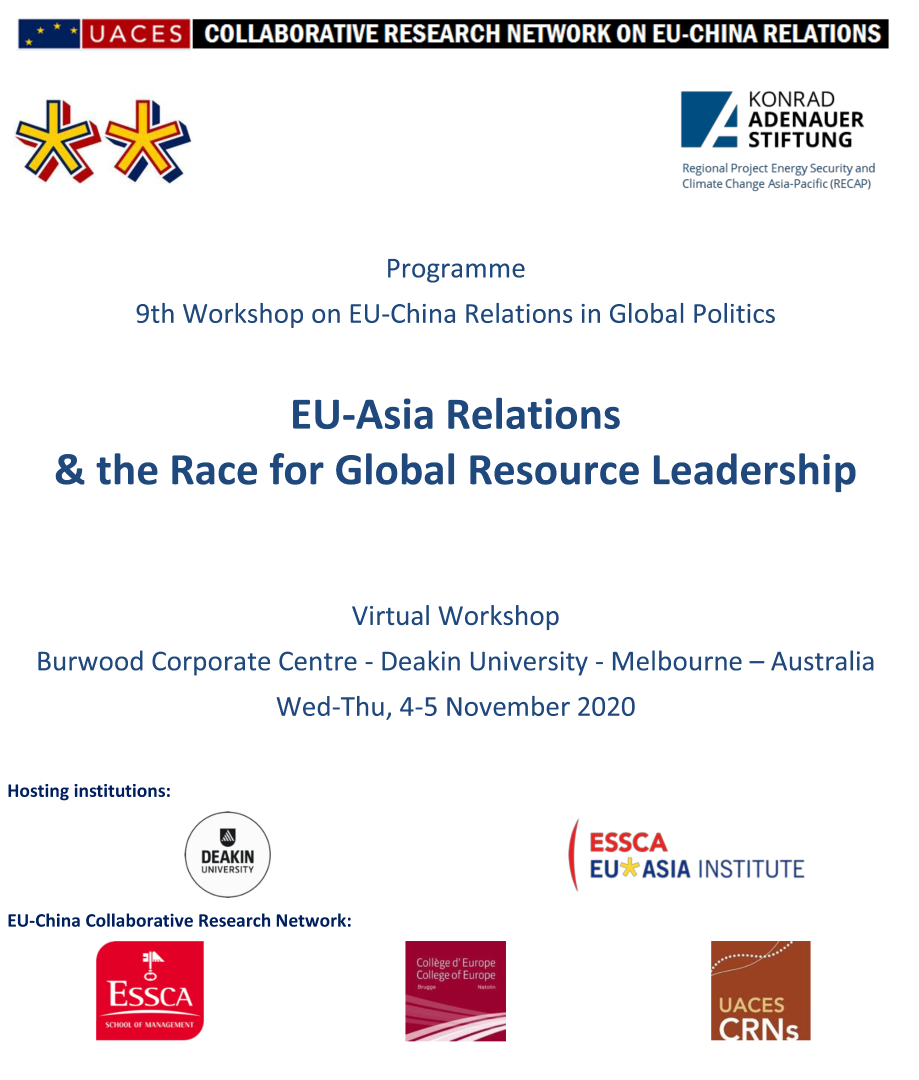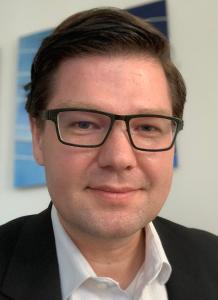Workshop
Details
The event takes place in the framework of the UACES Collaborative Research Network on EU-China Relations organised by ESSCA School of Management & College of Europe. The event is generously supported by Konrad-Adenauer-Stiftung, Regional Project Energy Security & Climate Change Asia-Pacific (RECAP), based in Hong Kong SAR China.
If you would like to join the workshop, please register via https://zoom.us/meeting/register/tJ0lc-mhrz8oE9JzpWVOjiF5v1jM2Ir5c-cy
For more details regarding the workshop, please visit http://euchinacrn.org/events/workshops/ninth-workshop-on-eu-china-relations-in-global-politics/
Program
DAY 1 – Wed, 4 November 2020 – Virtual Workshop on Zoom
Introduction to Workshop & Method
18:00 AST / 15:00 CST / 08:00 CET
- Prof Dr Gary SMITH, Deputy Vice-Chancellor for Global Engagement at Deakin University, Geelong.
- Dr Christian HÜBNER, Head of the Regional Programme Energy Security & Climate Change Asia-Pacific at the Konrad-Adenauer-Stiftung.
- Maximilian RECH, Director of Studies & Assistant Professor for International Affairs, ESSCA School of Management, Shanghai.
18:00 Australian Standard Time (AST)
15:00 China Standard Time (CST)
08:00 Central European Time (CET)
Race No. 1: Energy resources
18:15 AST / 15:15 CST / 08:15 CET
Race No. 1: Energy resources
In a world that consumes ever more energy, energy security and supply are as vital as ever. Global electricity production has risen from 11,692 TWh in 1990 to 26,599 TWh in 2019, according to the Global Energy Statistical Yearbook – an increase of almost 3% year on year.
At the same time, energy markets have not yet been able to accommodate increasingly diversified energy resources, ranging from fossil fuels to various renewables including hydro, wind, solar and waste biomass. COVID-19 and the ensuing economic slump has led to volatility in global oil markets, making fossil fuels affordable and slowing the transition to renewable energies. At the same time, national relief bills are focusing on investment in renewable energy infrastructure and global political and economic debates seek to prioritise future technologies. In that sense, the COVID-19 pandemic may accelerate the disruptive innovation and favour innovative players in energy markets.
The United Nations Environmental Programme’s global trends in renewable energy investment show that renewable energy capacity investment was geographically diversified across the globe and more cost-effective than ever, with investment totalling 282 bn USD in 2019. The apparent acceleration of investment in renewables combined with rapidly changing cost structures, driven both by state intervention and volatile energy markets, may have a disruptive impact not only in energy generation itself but across wide sectors including technology and resources.
Chair & moderator
- Prof Dr Andreas GOLDTHAU, Franz Haniel Professor for Public Policy of the Willy Brandt School at the University of Erfurt. Research Group Leader at the Institute for Advanced Sustainability Studies (IASS).
18:15 Australian Standard Time (AST)
15:15 China Standard Time (CST)
08:15 Central European Time (CET)
Moderated discussion with questions & answers
Coffee Break (15 min)
Race No. 2: Political economy, industrial policy & infrastructure
20:00 AST / 17:00 CST / 10:00 CET
Race No. 2: Political economy, industrial policy & infrastructure
The global political economy is ever more interdependent. The resilience of internationalised production processes and global supply chains present a challenge to companies. To give an example, more than 160 component suppliers from six countries contribute to making an iPhone. Hence, resources, such as energy, materials but also talent, knowledge and production processes, are dispersed around the globe. Meanwhile, the Coronavirus (COVID-19) has exacerbated the dangers of health pandemics and their potential negative effect on the world economy. The global political economy has momentarily come to a standstill and the disruption of supply chains but also the limitations on international travel have caused production process to come to a standstill.
Crisis response and a speedy economic recovery is key to kick-starting the global economy and closer economic cooperation between the United States or the European Union, China or Australia may help. Whilst interdependence remains a fact of life for all parties involved, each player seeks to identify the best strategies to facilitate the economic revival and secure access to resources as well as ownership of infrastructure and connectivity. At the same time, nations became painfully aware of the need to ensure technological sovereignty and strategic autonomy to guarantee supplies. Thus, the role of state intervention and industrial policy cannot be underestimated when it comes to questions such as trade, investment flows and technological development.
Chair & moderator
- Dr Kerry BROWN, Director of the Lau China Institute & Professor of Chinese Studies at King’s College London.
20:00 Australian Standard Time (AST)
17:00 China Standard Time (CST)
10:00 Central European Time (CET)
Moderated discussion with questions & answers
DAY 2 – Thu, 5 November 2020 – Virtual Workshop on Zoom
Race No. 3: Circular economy & materials
18:00 AST / 15:00 CST / 08:00 CET
Race No. 3: Circular economy & materials
The global public has never been more concerned about global environmental degradation than today. The momentary economic slowdown during COVID-19 has reduced greenhouse gas emissions worldwide, but societal costs were paramount and China’s rapid recovery points to a return to the status quo.
In the scramble to provide sustainable solutions, there are two main debates: firstly, what materials are we using for production and consumption, specifically in high-tech, and how sustainable are they? Think of lithium, titanium or rare earths: Who has access? How are they mined and processed?
Secondly, how can a circular economy help save the environment, with its concept of ‘reduce-reuse-recycle’ and the ‘share-repair’ principles? The shift towards a circular economy requires innovation in terms of policy frameworks, business models, design and technology, and consumer culture. There are many business models on the market addressing this. A successful implementation, however, also requires knowledge and networking of what works and what doesn’t, not only on a B2B level but also involving state actors and NGOs. The EU, China and other actors such as New Zealand increasingly promote the concept of a circular economy through policy interventions that may have an international impact. The question is then how to streamline different initiatives and advance on circular economy solutions?
Chair & moderator
- Dr Serdar TÜRKELI, Coordinator for Social Entrepreneurship & Public Policy at the United Nations University – Maastricht Economic & Social Research Institute on Innovation & Technology (UNU-MERIT).
17:00 Australian Standard Time (AST)
15:00 China Standard Time (CST)
08:00 Central European Time (CET)
Moderated discussion with questions & answers
Coffee Break (15 min)
Race No. 4: Business models & management methods
19:45 AST / 16:45 CST / 09:45 CET
Race No. 4: Business models & management methods
The global health pandemic has underlined the interdependence of the global economy. Competing strategies to emerge from the crisis focus on leveraging digitisation of business models and reassurance of consumers in times of changing consumption patterns. The so-called fourth industrial revolution, in which not only people but machines and ‘things’ are connected 24/7, combined with new technical possibilities such as robotics, artificial intelligence and virtual reality, causes entire business models to disrupt from one day to another.
This, in turn, may strengthen economies and thus states that successfully manage digital transformation. Such an environment makes sustainable, and most of all, flexible and agile business models and management methods ever more vital to surviving. Start-up businesses have shown established corporates all over the globe how to be prepared and how to be adaptable enough to compete in the ever-faster business world. Keywords are design thinking, agile management, new work models and big corporate intrapreneurship via incubators and accelerators. These methods and models have also gained a foothold in state administrations and may be of help to keep up in the race for global resource leadership.
Chair & moderator
- Dr Bardo FRAUNHOLZ, Associate Professor & Director of Postgraduate Programs in the Department of Information Systems & Business Analytics in Deakin Business School at Deakin University.
19:45 Australian Standard Time (AST)
16:45 China Standard Time (CST)
09:45 Central European Time (CET)
Moderated discussion with questions & answers
UACES Best Paper Award & Concluding Remarks
21:30 AST / 18:30 CST / 11:30 CET
UACES Best Paper Award & Concluding Remarks
- Dr Frauke AUSTERMANN, Associate Researcher at the ESSCA EU-Asia Institute
- Prof Dr SHEN Wei*, Associate Dean for International Relations at Deakin University & Jean Monnet Chair in EU-China Relations at ESSCA School of Management
21:30 Australian Standard Time (AST)
18:30 China Standard Time (CST)
11:30 Central European Time (CET)
End of Virtual Workshop
22:00 AST / 19:005 CST / 12:00 CET
End of Virtual Workshop
22:00 Australian Standard Time (AST)
19:00 China Standard Time (CST)
12:00 Central European Time (CET)




